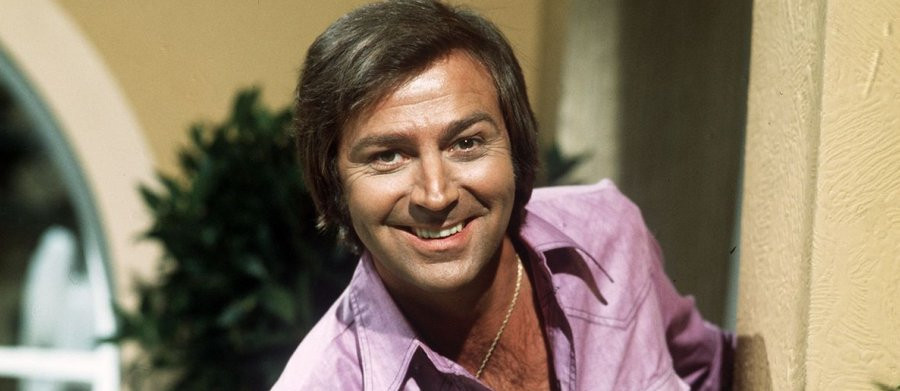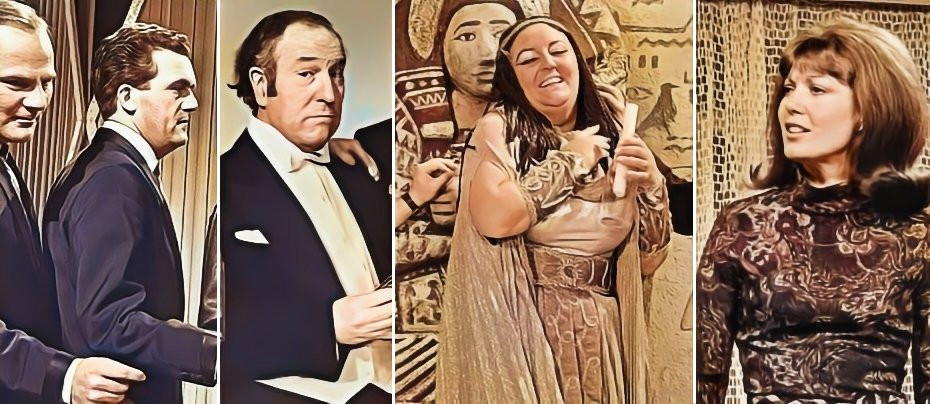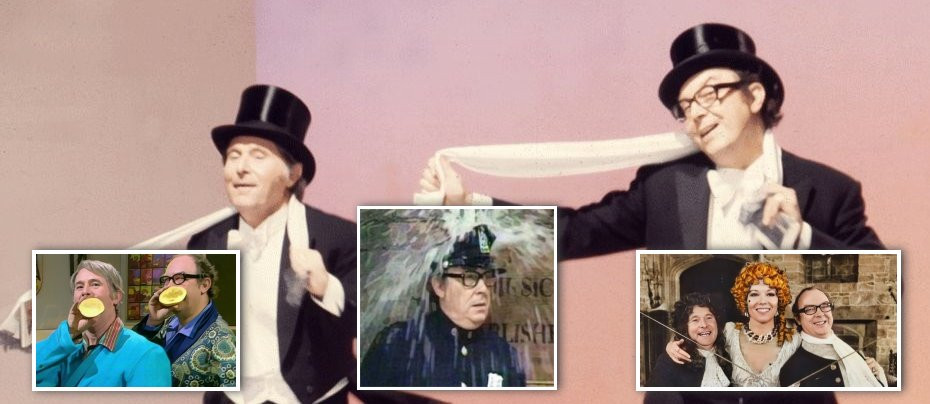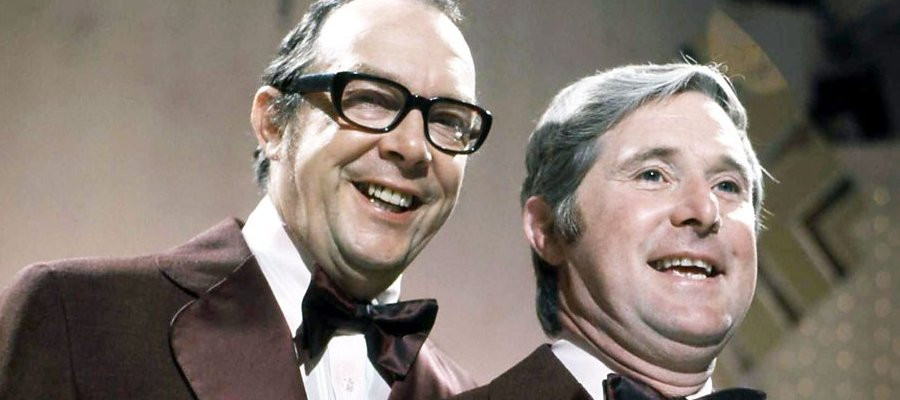
Morecambe and Wise
On the 25th December 1977 over 28 million people tuned in to a television show that had become a national institution. As much a part of Christmas as the Queen's Speech, Turkey and Plum Pudding, Morecambe and Wise's Christmas Day Special was an event not to be missed. Like most success stories this kind of adoration didn't come overnight. In Morecambe and Wise's case took more than thirty years of hard work, setbacks and refining their act to evolve a style that was quite unique. An act that twelve years after the death of Eric Morecambe, had television viewers voting for them as the Best Light Entertainment Performers of all time. This is their story...
John Eric Bartholomew, the only son of George and Sadie Bartholomew, was born at 12.30pm on 14th May 1926 in the front room of his parents neighbours house at 42 Buxton Street, Morecambe in Lancashire. At that time his father worked as a labourer with the Morecambe Corporation, earning around thirty-eight shillings a week. (These days the equivalent of £1.90). According to Eric it was Sadie who 'pushed' him towards a life in show biz, saying that she didn't want him 'tied to a whistle' like his dad. However, it was always Sadie's contention that Eric didn't need much pushing, never passing up the opportunity to perform his 'party piece' -a song and dance- at family gatherings. Even at the tender age of three it seems as though Eric was born to perform and entertain. He was in the true sense of the word a 'natural'.
But even naturals have to learn the tricks of their trade, and so Sadie arranged for Eric to learn how to play the piano, the clarinet and several other instruments, as well as packing him off to a dancing class. In order to pay for these lessons Sadie had to take on extra work, so on top of her cleaning job she also worked as an usherette at the Central Pier Theatre. Eventually, Eric (still only nine or ten), began to perform at local clubs for fees ranging from five shillings to a pound. In 1939, after a number of minor successes in local talent contests, Sadie entered Eric for an event organised by the music magazine Melody Maker, in the local leg of a national talent search competition, which Eric won. The prize was an audition with the famous Jack Hylton, whose shows always featured fresh new talent. Eric, it seemed was less than enthusiastic about travelling to Manchester where Hylton's show was currently on tour. However, it was here that another young star had already established himself in the discoveries show. Although they would not meet up just yet, their paths were destined to cross, and when that happened, it would change both their lives forever.
Ernest Wiseman was born in Leeds on 27th November 1925, at a local maternity hospital. His father, Harry, was a railway worker and his mother, Connie, a former box-loom weaver who had gone against her parents' wishes in marrying Harry, and as a consequence had been cut off from the rest of her family. Ernest was the eldest of Harry and Connie's children, he was followed by two brothers and two sisters although one of his brothers, Arthur, died of peritonitis at the age of five. Harry performed song and dance routines and told jokes on the local club circuit, and although his act was more amateur than professional, he began to build quite a reputation for himself. Around the age of six or seven it became evident that young Ernest wanted to follow in his father's footsteps, so Harry coached his son until they eventually formed a double act known as Carson and Kid.
The popularity of the double act (also known as Bert Carson and his Little Wonder), began to spread across the West Riding region -and bookings multiplied. Then, in 1938, the impresario Bryan Michie was touring the north in search of new juvenile talent to showcase in revue. Harry Wiseman heard about the auditions and made sure that young Ernest went along. At first it seemed as though Ernest had failed to impress because he was not contacted by Michie, then, one day, a letter arrived from London - not from Michie but from fellow impresario Jack Hylton. On 6th January 1939, Harry travelled down to London with Ernest, who did an audition for Hylton in his office. That same night Ernest made his West End debut in 'Band Wagon'. On Hylton's advice Ernest Wiseman became Ernie Wise and was awarded a five-year contract starting at £6.00 per week.
When Eric Bartholomew went to his audition in Manchester in front of Jack Hylton he would have been unaware that in the audience was Hylton's latest 'star'. Ernie Wise however, was extremely impressed if not a little threatened by the unknown comic performing in front of him. As Ernie recalled later, he wasn't the only one to sit up and take notice: 'The boys in the band turned to me and said, "Bye then, Ernie. Things won't be the same with this new kid around. What are you going to do now?"
However, in September of that year war broke out and the theatres closed down. Eric returned home without hearing about the results of his audition and Ernie returned to Leeds, where, after working for a few months as a coalman's labourer, he received a telegram from Bryan Michie inviting him down to the Swansea Empire to join the touring version of Youth Takes a Bow. The theatres were opening up again.
Eric was also invited to Swansea and, accompanied by Sadie, made the trip. It was here that the boys finally met up. As the show toured so Eric and Ernie started to form a friendship, then sometime around 1940 Ernie found himself wandering the streets of Oxford without any digs for the night. Going from guesthouse to guesthouse Ernie finally arrived at the same place where Eric and his mother were staying. When Sadie overheard Ernie asking for, and being refused a room, she immediately offered him a place in the room Eric and she were staying in -sharing Eric's bed! From that day on Eric and Ernie shared digs together wherever they went.
About a week later, the boys they found themselves performing their individual acts in Coventry, which had been badly bombed. Because of the damage they had to stay 21 miles away in Birmingham. The journey to and from the theatre was a long one and all three had plenty of time to talk. Inevitably the conversation always revolved round showbiz and the two acts. One night, on returning from their show Sadie made a suggestion. "Why don't the two of you try a double-act?" They both agreed that it was a good idea and Sadie set about finding them a song and dance routine whilst the boys set about finding some gags.
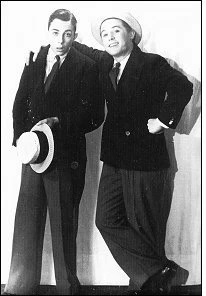
For the next three or four weeks Eric and Ernie, whilst continuing to perform their solo spots, set about learning a new four-minute double-act routine and eventually they approached Bryan Michie with it. Michie liked what he saw but would not commit himself to giving the boys a slot on the show without Jack Hylton's say so. The next time that Hylton came up from London to see the show was in Liverpool, Ernie cornered Hylton in Michie's dressing room and asked him to watch the act. Hylton liked it too and told Michie to find them a slot the next Friday night, 28th August 1941.
That was the start, but it took time before the double act became an established part of the bill, most of the time they were only allowed to perform it when an act had to drop out for one reason or another. The audience reaction was very good for Bartholomew and Wise, but it was around this time that another important change took place, this time in Nottingham. Eric recalled: "My mother was talking to Adelaide Hall, the coloured American singer on the bill and explaining to her how nobody liked the name Bartholomew and Wise. Adelaide's husband, Bert Hicks, overheard and said that he had a friend who called himself Rochester because he came from Rochester, Minnesota." Bert asked Sadie where she came from.
"Morecambe." she replied.
"That's a good name. Call him Morecambe."
They all liked the name and from then on the boys became Morecambe and Wise.
In early 1942, with audiences declining rapidly, Jack Hylton decided to bring down the curtain for the last time on the show. For Eric and Ernie it meant the end of their double act. Eric returned home and got a job in the local razor-blade factory and Ernie tried his luck in London to find a slot in a show. This situation lasted for three months and eventually Ernie travelled to Morecambe to stay with Eric.
Reunited they tried to find work in any club or concert party that would have them, however, there were no offers of work. Once again Sadie decided to take a hand in guiding their future and she took them off to London to visit an agent she had heard of in Charring Cross Road. The agent didn't sign them but he suggested that they visit the Hippodrome where auditions were taking place for a new show, Strike a New Note.
Their partnership was broken up again when Ernie received his call-up papers on 27th November 1943; he elected to join the Merchant Navy and ended up ferrying coal from Newcastle to London. Some months later Eric was conscripted and selected to work as a 'Bevin Boy', which involved him being sent down to work in the coalmines. After eleven months of this he was classified 'C3' with heart trouble and sent home to Morecambe. The resulting effect this would have on his health would plague him for the rest of his life.
After the war the boys tried hard to find work. They had about a ten-minute act including an opening song and a soft-shoe dance number at the end. Unfortunately they found it hard to get any work without an agent, and most agents were not interested in them until they had work. They managed to pick up the odd date here and there, got some work with ENSA doing a tour of the American army camps in Germany, but mainly they were lucky if they got four weeks work at a time.
It was round about this period that they landed themselves a regular date at the Windmill Theatre in London's West End. The Windmill was famous for being the only London theatre to have stayed open throughout the bombing. 'We never closed' became its slogan. But now it became famous for something else.
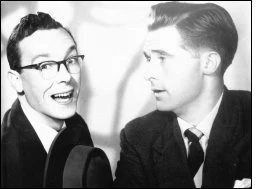
From midday to midnight it featured fan dancers and a chorus of near naked women. It was also the breeding ground for a new generation of comedians. Harry Secombe, Peter Sellers, Benny Hill, Norman Wisdom and Tony Hancock were amongst the names to appear there with a varying degree of success, and in some cases, failure. It was the latter fate that Eric and Ernie suffered after only one week. Fortunately though, Ernie had the presence of mind to go to the theatre's owner and ask if he could put an advertisement in variety to the effect that, 'Morecambe and Wise are leaving the Windmill due to prior commitments.' The theatre owner, Vivian Van Damm, agreed and the boys left with their reputation intact.
Eric and Ernie continued to tour the variety circuit polishing their act as they went along and towards the end of 1950 an agent, Frank Pope, came to see them perform in Grimsby. Pope liked what he saw and signed them up to a sole agency agreement with a guaranteed minimum wage of £10.00 per week. Pope found the boys regular work, and through this they were able to build their confidence and improve their rapport, both with each other and their audience.
By 1952 Morecambe and Wise were well known radio voices, having a regular spot on Variety Fanfare on BBC Radio. Then in 1954 they were given the chance of their own TV series, 'Running Wild'. The first show in the series aired on 21st April 1954 at 9.40pm, and the following day the boys held their breath as they opened the morning papers to read the reviews. The critics seemed unanimous in their verdict -They hated it.
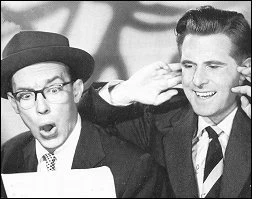
Not only did the critics hate the show, they attacked it with such fervour that each review Eric and Ernie read was, according to Eric, "Like a slap in the face." At a time when the boys were building a reputation for themselves as a quality act, this one thirty minute show was set to damage their credit up and down the country in full view of the public. After a second and third show, which only showed a very small improvement, the boys went to the BBC and suggested that it would be in everyone's interest to cancel the remaining three shows. However, the BBC decided to stick with the series. By the end of the series Morecambe and Wise's credibility had been damaged so badly, that the best date they were offered was an embarrassing fourth on the bill at the Ardwick Hippodrome in Manchester.
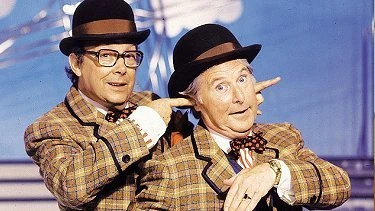
Eric and Ernie had high hopes of breaking into the fresh new medium of television -they felt that they were 'right' for it. So when the critics slaughtered 'Running Wild' their confidence took quite a battering. At the end of the run of six fortnightly shows they returned to the stage to do what they did best - perform in front of a live audience.
Not knowing what sort of reception they would get and only being able to secure fourth place on the bill, the boys set about re-writing their act. Eric in particular thought that the act had been too static for too long and it was time that they started putting their own personalities across. When they stepped out on stage at the Ardwick Hippodrome, Manchester with their new material and for that first post TV appearance, they thought that their reputation was as low as it had ever been. But as they began going through the new routines they discovered that the audience responded to them in a very positive way. In no time at all they felt their confidence surging back, at the end of the show they got a standing ovation. From that moment on the act went from strength to strength.
By the spring of 1956 they were encouraged to make a return to television as regular guests on the newly formed commercial television station ATV. The series starred Winifred Atwell and, although the boys were nervous about returning to the medium that had treated them so badly in the past, they did finally agree. One of the factors that they decided was in their favour was that it wasn't actually their show; therefore all the responsibility wasn't on their shoulders. Another was that their material would be written to suit their own style by a man who was fast becoming one of the foremost comedy writers in the country - Johnny Speight.
On 21st April 1956 the first show went out to a live audience. As the boys went through a routine in which Eric, playing a drunk, gets out of a taxi, things began to go horribly wrong.
The Taxi could not be driven on or off the set so it was arranged that it would be pulled on a rope. Without thinking, Ernie, playing the taxi driver, put the vehicle into gear so that when it was time to pull it off set it wouldn't move. Eric began ad-libbing and pushing the vehicle, then he got into the front of the taxi to see if he could help, at the same time he was trying to whisper instructions to Ernie out of the side of his mouth. These were all picked up by the microphones and transmitted to the television audience. Finally someone worked out what had gone wrong and knocked the gear lever into neutral. At the end of the show Morecambe and Wise were convinced that they'd just taken part in yet another television disaster - but they were wrong. The audience loved the sketch and the boys ad-libbing under stress went down so well that in future weeks the production team would make sure that certain props would fail on purpose, without telling Eric and Ernie which ones they were. Guest appearances on other TV shows followed and in 1958, with a growing reputation, they set off for a six-month tour of Australia.
In the six months that they were away, the entertainment business in England undertook a big change. With television becoming more and more popular, variety clubs up and down the country began closing their doors for the last time. They were simply unable to attract the audiences they needed to survive. By the time the boys returned home it was quite clear that if they wanted to survive as an act they would have to take the plunge again with their own series.
In 1960 they made twelve appearances on Val Parnell's Sunday Night at the London Palladium, six spots on 'Saturday Spectacular' and four on 'Star Time' -to the television audience of that era, with only two channels to choose from, it seemed as though Morecambe and Wise were on television every time they switched it on, so it was only natural for them to have their own show. Now represented by the agent Billy Marsh, Eric and Ernie felt ready to face the television public on their own and put the fear of their experience on 'Running Wild' well behind them. Marsh phoned Lew Grade at ATV to offer the boys' services -he turned them down flat.
Lew Grade didn't believe in Eric and Ernie's ability to sustain a whole series and wasn't prepared to take a gamble. However, it was at this point that the boys had a stroke of luck. It seems as though Grade had heard on the grapevine that the actors union Equity were on the verge of calling their members out on strike. If this were to happen it would mean a loss in ATV's programme output. A few days after Marsh's initial approach to him, Grade phoned back: "Are Morecambe and Wise in Equity or VAF?" (Variety Artists' Federation -the other big union at that time). Marsh informed him that the boys were VAF members. "Okay." Said Grade "You've got yourself a series."
One of the problems that television posed was the way in which it ate up material. In variety there were performers who hadn't changed their acts in years, not a single line, not a single word. They relied on the fact that by the time they had toured the country, not only would they have a new audience, but those that had seen the act before were now several years older, and wouldn't remember much about it. This simply didn't apply in television. If you had a weekly series you needed constant new material -you certainly couldn't get away with the same act week after week. With this in mind Eric and Ernie approached the already established script writing team of Dick Hills and Sid Green. However, things didn't go according to plan at first.
The first show (12th October 1961) went down to a lukewarm reception, Eric and Ernie were unhappy that the sketches Hills and Green had written featured too many 'extra's' and didn't allow the boys own personalities to shine through. In spite of their objections Morecambe and Wise were overruled and the second show went out with the same format. Again audience reaction was very cool. Then, the threatened Equity strike that Lew Grade had got wind of started.
Sid and Dick thought it a disaster, Eric and Ernie would be robbed of the extra's that the writers were including in nearly all of the sketches. They even told the boys at the time that this would finish them. But for Eric and Ernie it was just what they needed. They played all the different parts giving them full audience attention. Sid and Dick themselves were included in many of the sketches, often bearing the brunt of Eric's jibes and ad-libs. More and more the boys own personalities began to shine forth, and, just as they had predicted, it was this that won the audience over. The strike lasted for twelve weeks, the same length of the series and by the end of it Morecambe and Wise had established themselves as the most watchable light entertainment show on television. ATV had no hesitation in commissioning another series. Morecambe and Wise had at last discovered a format for mastering television.
With the success of their first ATV series, Morecambe and Wise established themselves in the minds of the British television public along with their various catchphrases ('Get out of that!' - 'Tea Ern?'). The quality of their guests got better, and in December 1963 they recorded a show with The Beatles. They treated the most famous pop group of all time with a total irreverence that they would become famous for in later years. In a parody of Eric's description of Ernie being the one with the 'short fat hairy legs', George Harrison described the foursome as the 'one's with the big fat hairy heads.' Eric mistook the lads for the Kaye Sisters and kept referring to Ringo as 'Bongo'. When asked in 1994 to name his favourite of the many shows the Beatles appeared on, Paul McCartney didn't hesitate in responding 'The Morecambe and Wise Show'.
By the end of that year their third series had reached Number Two in the top twenty TV ratings, second only to Coronation Street. They topped the bill on Sunday Night at the London Palladium, and were voted top TV Light Entertainment Personalities of the Year by The Guild of TV Producers and Directors and their Christmas pantomime at the Bristol Hippodrome broke all previous box office records for the theatre.
Everything, it seemed, that Morecambe and Wise did went down well with their audience and fellow professionals alike. Everything except for their three attempts to break into the movies. The first of these was The Intelligence Men, followed by That Riviera Touch and finally The Magnificent Two. It is true to say that as far as movies were concerned Eric and Ernie were never served well by the scripts they were offered and never managed to reach their full potential in this medium. However, by 1968 they were ready to sign another lucrative deal with ATV. Lew Grade offered the boys £39,000 for 39 25-minute shows over a period of three years. This time they turned him down.
One of the key points in the break-down in talks with Grade was that in order to improve the quality of their shows the boys wanted them shot in colour. Colour television was still in its infancy in Great Britain at that time and it's alleged that Grade turned on the boys telling them "You'll have colour when I say you'll have colour!"
Bill Cotton Junior who was the Head of Variety at BBC Television in 1968 was in his office one day when he received a phone call from Michael Grade -Lew Grade's nephew- who worked for Billy Marsh. Michael told Bill that he thought Morecambe and Wise were 'available'. Bill Cotton, a great admirer of the boys for many years, negotiated a three-year contract for Eric and Ernie without giving it a second thought. The boys got what they wanted, more money and a colour series on BBC2 (the only station able to offer colour transmission at this time), with guaranteed repeats on BBC1.
Cottons first task was to assemble a new production team for the forthcoming series. He reluctantly agreed to retain the services of Hill's and Green and for producer/director he turned to John Ammonds. Under the guiding and experienced hand of Ammonds, Morecambe and Wise grew in popularity. He taught them to exploit the medium of television to its full potential. He taught Eric to 'use' the camera in order to get intimate with the television audience, to take them into his confidence. When playing a joke on Ernie or one of their guest stars Eric would turn to camera and whisper, "This boy's a fool". The audience loved it, they loved him, and they loved Morecambe and Wise. Just how much they loved them the boys would soon discover, when, after shooting that first series for BBC2, Eric suffered the first of his heart attacks. It was the 7th November 1968.
When Speaking on The Parkinson Show some years later, Eric Morecambe took the events of the night of 7th November 1968, and turned them into a comedy routine. At the time though, it was no laughing matter. Eric had been feeling unwell for several days leading up to that Thursday night. Following a 75-minute spot at Jimmy Corigan's Variety Club in Batley, West Yorkshire, he was driving back to his hotel when he suddenly started getting pains in his upper arms and chest. Eric managed to stop a passer-by who drove him to Leeds Royal Infirmary where he was diagnosed as having a massive heart attack. Joan, his wife was called for, as the doctors feared the worse.
Although Eric survived the heart attack there were serious doubts as to whether or not he'd ever work again. But thanks to six months convalescence, the loving care of his family and the dedication of Joan, he returned for a press call to BBC Television Centre in May 1969. In August Morecambe and Wise returned to stage at the Winter Garden Theatre in Bournemouth and got a standing ovation of over four minutes. However, before they could return to the TV there was yet another problem to sort out. Not knowing if Eric was going to return to work -and not wanting to be unemployed themselves, Sid Hills and Dick Green had signed an exclusive deal with ATV. They could no longer be Eric and Ernie's scriptwriters. It was Bill Cotton Jnr who suggested Ken Dodd's former script writer, Eddie Braben. Although the boys were unsure if Braben's style would suit them, they agreed for him to write a show. The show was well received and after three more 'trial runs' Eddie became their official scriptwriter.
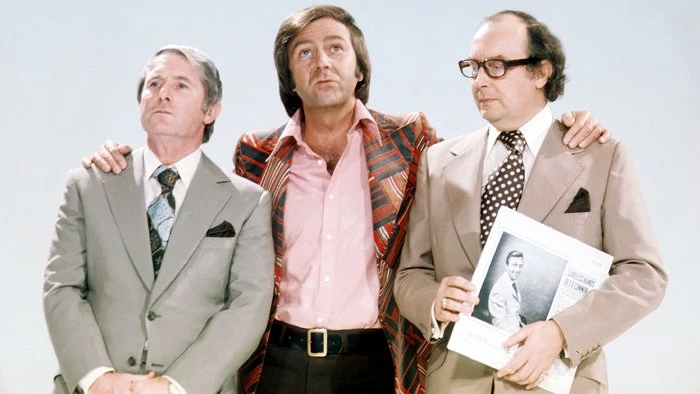
Eddie Braben got an immediate grasp of what made the boys tick, and his scripts developed Eric and Ernie's own personalities even more. Ernest Maxin succeeded John Ammonds as producer/director in 1974, keeping the formula for the shows the same with a little more emphasis on song and dance/comedy routines. Award followed award for Morecambe and Wise, from BAFTA (1969, 1970, 1971, 1972 and 1973), Variety Club of Great Britain (1974, 1976 and 1978), Radio Industries Organisation (1971 and 1972), Water Rats (1970 and 1974), The Freedom of the City of London (1976) and OBE's (1976). Their 'Christmas Specials' became the highlight of the year for most viewers and in 1977 they broke all records when over 28 million viewers (at the time more than half the population of the entire country), tuned in to watch their show on the 25th December.
At the end of 1977 the boys were lured back to independent television and signed a contract with Thames TV. But in March 1979 Eric suffered his second heart attack and had to have a lifesaving by-pass operation. The nation watched -held it's breathe- and once again he returned to work.
On 27th May 1984, Eric agreed to make a guest appearance on stage at the Roses Theatre, Tewkesbury. The idea was simply for Eric to sit down and be interviewed about his career by his friend, comedian and actor Stan Stennett. But Eric being Eric he could give nothing but 100% to his adoring public, and as the show came to an end he joined in a furious finish with the band, running around and playing all the instruments. At the end of the show he took his applause and left the stage. No sooner was he out of sight than he was struck down by his third, and this time fatal heart attack. It's ironic to think that a few months before, one of Eric's close friends, Tommy Cooper, had died whilst on stage during a live television broadcast. When interviewed, Eric had said that he hoped he wouldn't go like that, in front of an audience. It seems as though his last wish was granted.
Tributes poured in from show-biz friends and fans from around the world. Ernie Wise said of his great friend of 43 years, "He was a natural comedian, I am very, very proud to have been his partner." On June 4th more than a thousand people gathered outside the Church of St. Nicholas in Harpenden for his funeral. Dickie Henderson gave an address that was transmitted to the crowds outside by loud speakers, he told how Eric had written to him the year before to say how much he enjoyed Dickie's speech at Arthur Askey's funeral and wrote; "I would like to book you now for mine...work permitting."
Ernie Wise kept on working, he returned to the stage in Dickens' unfinished The Mystery of Edwin Drood, followed by Run For Your Wife, presented a series of Morecambe and Wise repeats and appeared on television game shows such as Countdown and What's My Line. In December 1993 Ernie suffered a stroke followed by another in 1995, which finally made him announce his formal retirement from show-biz. Then in March 1999, whilst on holiday in Florida, he suffered a third stroke. He died a few weeks later, March 21st, aged 73.
Eric and Ernie spent over thirty years together perfecting their act, and their act was as near perfect as any comedian or double act has ever achieved. In the BBC's 1996 anniversary poll, viewers voted Morecambe and Wise as 'The Best Light Entertainment Performers of All Time'. A plaque at Pinewood Studio's Hall of Fame hails them as the finest double act of the century, and a statue of Eric, unveiled by the Queen, stands in his hometown of Morecambe in Lancashire. Her majesty was a fan too. Rumour has it that on one occasion she delayed Christmas lunch in order to watch their show.
And finally -as possibly the ultimate accolade- in December 1999 the Internet bank, Smile, conducted a survey, which resulted in Eric being voted the funniest man of the twentieth century!
As Eric would say: There's no answer to that!
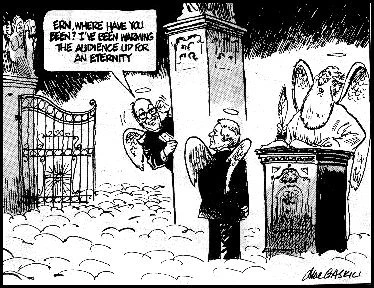
Published on February 20th, 2019. Written by Laurence Marcus (January 2005) for Television Heaven.


